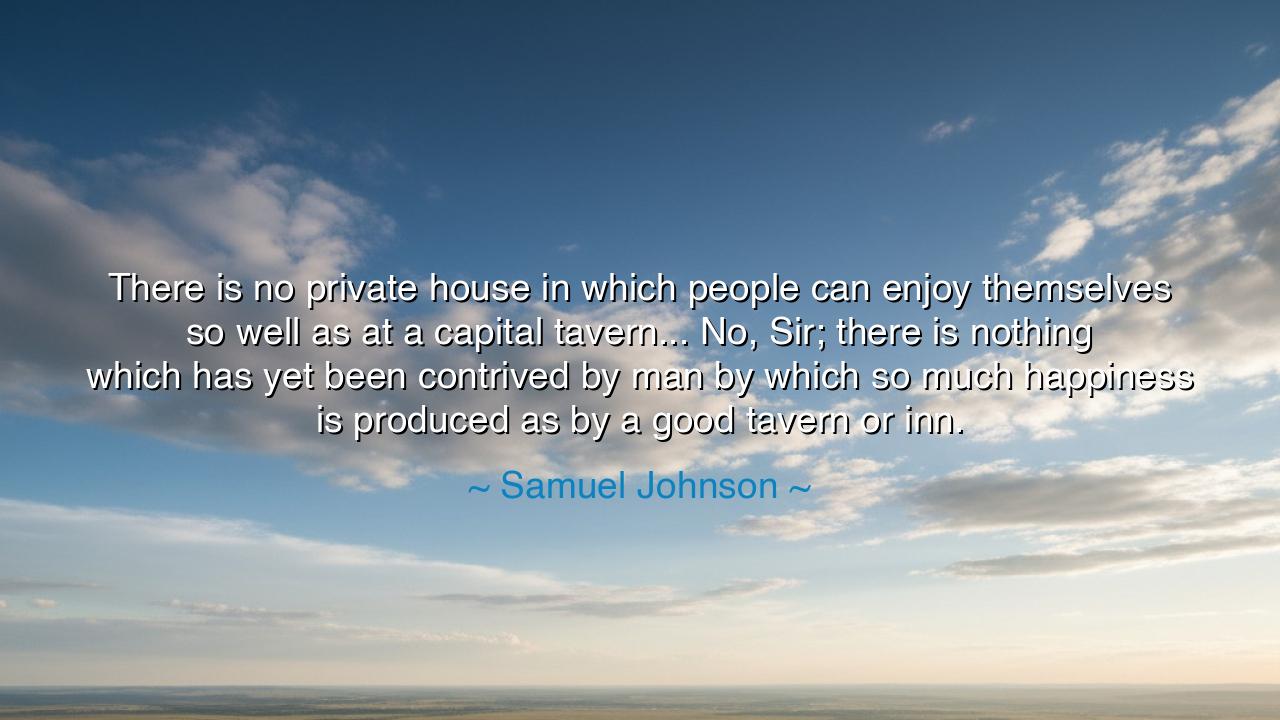
There is no private house in which people can enjoy themselves so
There is no private house in which people can enjoy themselves so well as at a capital tavern... No, Sir; there is nothing which has yet been contrived by man by which so much happiness is produced as by a good tavern or inn.






Hear now the hearty and timeless words of Samuel Johnson, the great moralist and lover of human fellowship, who once declared: “There is no private house in which people can enjoy themselves so well as at a capital tavern… No, Sir; there is nothing which has yet been contrived by man by which so much happiness is produced as by a good tavern or inn.” Beneath this seemingly simple praise of ale and lodging lies a profound understanding of human nature — that happiness, in its purest form, often springs not from grandeur or solitude, but from companionship, conversation, and the warmth of shared humanity.
The origin of this saying comes from the fireside wisdom of Dr. Johnson, as recorded by his faithful companion James Boswell in The Life of Samuel Johnson — a work that preserves not merely the man’s words, but the music of his soul. Johnson, who lived in the 18th century, spent countless evenings in the taverns and coffeehouses of London, surrounded by friends, poets, and thinkers. There, in smoke-filled rooms alive with laughter and debate, he found not only pleasure but a reflection of life itself — vibrant, unpredictable, filled with meaning. To him, the tavern was not merely a place of drink, but a temple of fellowship, a gathering ground where men cast off rank and pretense, and met as equals in the communion of thought and joy.
To the modern ear, Johnson’s words may sound lighthearted — yet they conceal a deeper truth about the human condition. For even in the grandest homes, where wealth and comfort abound, there is often a loneliness that no fire can warm. But in the humbler company of strangers and friends gathered in laughter, something eternal awakens — the ancient human hunger for connection. Johnson saw that in the inn, travelers and townsmen alike could find temporary kinship, a shared respite from the world’s burdens. Here, in a place not owned by any man, each found freedom from his own cares, a brief harmony in the great music of existence.
The ancients too knew the sacredness of such gatherings. In the days of Homer, the banquet hall was a place of storytelling and memory, where heroes sang their sorrows and kings welcomed the wanderer. Even the gods of Olympus feasted together, their divine joy echoing the laughter of mortals below. The great philosopher Aristotle wrote that friendship is one soul dwelling in two bodies — and what is a tavern, if not the house of friendship itself, where many souls share one table, and many lives cross like stars?
Consider the tale of Ben Jonson and William Shakespeare, who in the taverns of Southwark forged the camaraderie that gave birth to the English stage. In those noisy inns — the Mermaid Tavern, the Boar’s Head, and the Globe’s neighboring alehouses — wit was sharpened, ideas exchanged, and the foundations of culture laid. There, in the smoke and clatter of tankards, genius was not solemn, but joyful. The tavern, as Johnson knew, was not an escape from life’s seriousness, but a celebration of its fullness — the laughter that lightens labor, the fellowship that tempers sorrow.
In Samuel Johnson’s view, the inn was also a symbol of life’s journey. Each of us, he believed, is a traveler, resting for a while between the roads of birth and death. The tavern represents the resting-place of the spirit — a brief moment where burdens are set down, stories exchanged, and hearts restored. Its happiness is fleeting, yes, but in that transience lies its beauty. It reminds us that life’s greatest joys are found not in permanence, but in presence — in being wholly alive to the moment and to one another.
Let this, then, be the lesson passed to all generations: cherish the simple gatherings, the laughter shared over bread and drink, the conversations that awaken the heart. Do not seek happiness in isolation or in possessions, for it lives in connection — in those humble, human spaces where hearts meet without armor. Be as the travelers of old, who found in the tavern not only comfort, but communion.
Thus spoke Samuel Johnson, with both mirth and wisdom: “There is nothing which has yet been contrived by man by which so much happiness is produced as by a good tavern or inn.” For in the glow of such places, the walls between souls dissolve; the weary are renewed; and for a fleeting hour, we remember that to live is to share the journey — and that even amidst the simplest laughter and the humblest cheer, the divine spark of humanity burns brightest.






AAdministratorAdministrator
Welcome, honored guests. Please leave a comment, we will respond soon